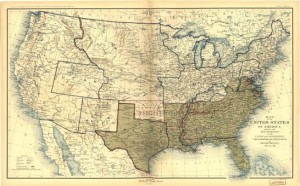 Today’s edition of the South Carolina Confederate Baptist weighs in on two hot issues: slavery and church state separation.
Today’s edition of the South Carolina Confederate Baptist weighs in on two hot issues: slavery and church state separation.
Of the former, most white Baptists of the South are largely in agreement that African slavery is God’s will and that blacks are intellectually incapable of handling freedom. The editor of the Confederate Baptist summarizes these views quite vividly against the backdrop of the United States enrolling free blacks in the Union army:
….None but an interested colored gentlemen or a white fanatic could deny the inferiority [of blacks]; and yet these are the people whom Lincoln has selected to “finish up the subjugation” of the South–as if the negro were ever known to finish anything but the polishing of a boot; and even that not always well. The truth is the negro is a child, of mature physical powers; and in Church and State, should be held and treated as such.
His incapacity has made him a dupe of his philanthropic friends, and whenever he has heeded their counsels, he has become their prey. The peaceful and contented tiller of the soil has been transmuted by the Yankee craft into a soldier, only to perish by violence or disease….
In fact, black Union soldiers have shown that they are every bit as brave as brave and intelligent as their white counterparts. Confederate leaders, however, are intent on suppressing the effectiveness of black troops fighting in the Union Army.
Of the church state question, however, the Confederate Baptist parts ways with most other Baptist newspapers of the South. Whereas Baptist editorial opposition to Sabbath army drills, troop movements and mail delivery is widespread throughout the Confederacy–with proponents of such positions arguing that the Confederacy, as a de facto Christian nation, must obey the laws of God–the Confederate Baptist takes the opposite (and traditionally Baptist) position. For thus dissenting from the contemporary popular Baptist stance in the South, the Baptist takes harsh fire from otherwise-friendly newspapers, such as this criticism from the Baptist Banner, an independent newspaper published in Georgia:
The Confederate Baptist thinks we are ready to surrender our religious liberty when we ask the government to cease to sin against God by desecrating the Holy Sabbath. God has expressly said, “remember the Sabbath day to keep it holy. In it though shalt not do any work.” This law is binding just as much upon the government as upon the people. The government disregards it, and brings the curse of God upon the nation. We as citizens are bearing it now. We venture humbly to ask the government to leave off the sin, that God may turn his hand and bless us. And this, forsooth, is giving up our religious liberty!
The response of the Confederate Baptist is clear and biting, alluding to an earlier era in American history when Baptists were persecuted for not obeying government-mandated biblical laws:
Our position is this: We are utterly opposed to the interference of government to uphold any institution of revealed religion. The principles of natural religion, it is bound to recognize, so far as they may be essential to the discharge of its functions, which are purely earthly and temporal; but with revealed religion, of any form of it, government has nothing to do. Whether Sabbath days and saint’s days are matters of Scriptural obligation is a question as foreign to the legitimate business of legislation as the question of infant baptism.
The debate over church state separation continues throughout the war. That most Baptist divines voice approval of the Confederate government enforcing biblical Sabbath laws is indeed a sharp reversal from their faith’s historic position.
Sources: Confederate Baptist, November 4, 1863; see Bruce T. Gourley, Diverging Loyalties: Baptists in Middle Georgia During the Civil War, Macon, Ga.: Mercer University Press, 2011 (link)


